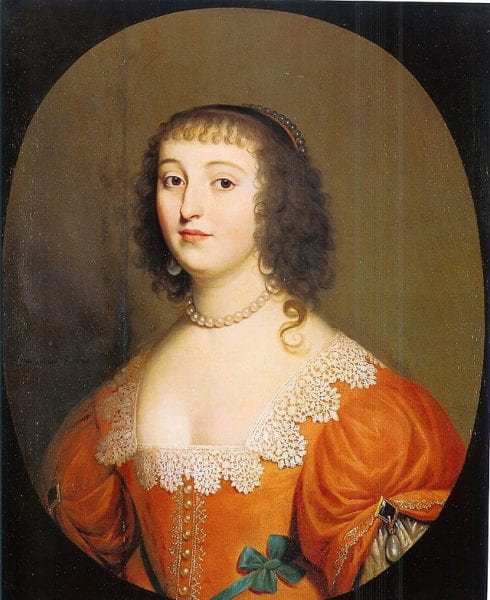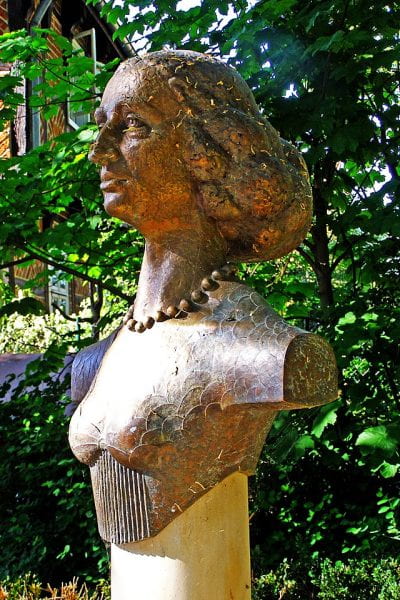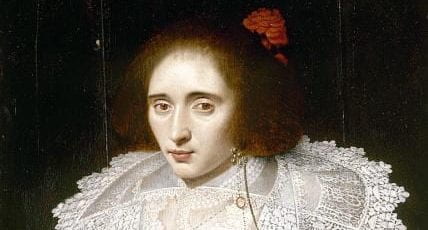Princess Elisabeth of Bohemia was born in 1618 in Heidelberg, Germany. She was the third child of Elisabeth Stuart, the daughter of King James I of England, and the Protestant King Frederick V of Bohemia. Elisabeth was formally tutored in many subjects, including a handful of Romance languages, logic, mathematics, politics, philosophy, and science, and was nicknamed ‘La Grecque’ (“The Greek”) as a reflection of her intellectual aptitude. While still a child, her family was ousted from the throne during the onset of the Thirty Years War, and they lived in exile with no fortunes or land at the Hague in the Netherlands. It was at this intersection of Dutch religious tolerance, the republic of letters, and political exile, that the Princess was raised and educated, and which provided her the opportunity of intellectual correspondence with many pre-Enlightenment thinkers of the era.
As a teenager, the Princess used the court as a meeting ground for many of Europe’s top philosophers. Despite her family’s lack of financial resources and inability to provide patronage, the court still attracted many influential thinkers of the time, both male and female. Some of the most notable thinkers that came to the Hague include Anna Maria van Schurman, Marie de Gournay, Marie du Moulin, John Dury, and Rene Descartes. Not satisfied with merely playing hostess, and despite her young age, Elisabeth still played an active role in these academic discussions that she organized. She would also continue these discussions through letter correspondences with many of these thinkers, through which she had a great influence on their developing philosophical views and published works.

Portrait of Elisabeth of Bohemia by Gerard van Honthorst, 1636. Source: Wikimedia Commons. Public Domain.
At the end of the Thirty Years War, Princess Elisabeth would return to Heidelberg, where she played an instrumental role in re-establishing the University of Heidelberg. Though not given a formal appointment at the University, she was well-known to be the foremost expert in Cartesian philosophy in Heidelberg at the time. Through her professorship, she attracted a group of students who dedicated themselves to reading and learning Cartesian philosophy, and she would contribute greatly to the spread of Cartesian ideas through Germany at that time. Later on, she would become Abbess of Herford Abbey, where she would stay until her death in 1680. Here, she corresponded with and provided asylum to another swath of great thinkers, including Quaker William Penn, Henry More, Anne Conway, Gottfried Wilhelm von Leibniz, and Nicolas Malebranche.
Princess Elisabeth is perhaps most famously known for her letter correspondence with Rene Descartes over the last seven years of his life. In these letters, the two thinkers discuss the Cartesian soul-body duality, her own physical illnesses, the passions, and moral philosophy. Traditionally, these letters are seen to show Elisabeth to be a staunch critic of Cartesian duality and his interpretation of the passions, and her critiques would play a role in Descartes’ later developments in philosophical views and works. Descartes’ Principles of Philosophy and Passions of the Soul were both written in response to Elisabeth’s critiques and show the heavy influence that she had on his philosophy. At the same time, through these letters, Elisabeth describes a version of her own positive philosophy, which adopts some choice elements of Cartesian dualism, while also foreshadowing different elements of Hobbesian reductionist materialism and Humean causality. Despite her lack of individually published works, we can see through her letters and correspondences that Elisabeth’s philosophy cannot be described as purely Cartesian, or purely contained within Descartes’ later published responses. It can therefore be said that Princess Elisabeth was not merely a Cartesian muse, as she was traditionally interpreted to be, but rather an individual thinker in her own right who contributed to the philosophical discourse of her era.
In the Princess’s first letters to Descartes, she introduces her first critique of an axiomatic Cartesian principle. She asks “how the soul of a human being (it being only a thinking substance) can determine the bodily spirits, in order to bring about voluntary actions,” framing the Cartesian mind-body interaction problem on which their first few letters focus on. A key component of Cartesian philosophy is the belief in soul-body duality, where the two parts are completely separate entities, the soul being metaphysical and responsible for thought, though immaterial and lacking in a physical extension, and the body being physical, but lacking in intelligence and incapable of initiating action. The soul alone is Descartes’ “thinking thing”, the sole source of human reasoning, but through the senses, it becomes aware of and in some way connected to the body. The nature of that connection has been a repeated point of criticism towards Descartes’ philosophy, and Elisabeth is neither the first nor the last critic to ponder over it. In her letter, Elisabeth argues that when physical bodies move, it must have interacted with another physical body to cause that motion, and so if the soul is able to induce motion in the body, it must also have a physical component. In Descartes’ response, he says that the soul commands the body through “animal spirits” contained within the blood, and that laws that govern interactions between two physical bodies cannot be applied to interactions between the soul and the body since the soul is immaterial and does not follow those laws. He further compares this interaction to the way gravity interacts with physical objects. Gravity is the force that pulls an object towards the center of the earth, but gravity is not an essential aspect of that object. Similarly, the soul can initiate motion in the body without having a physical extension within the body. To this point, Elisabeth responds, “I admit that it would be easier for me to concede matter and extension to the soul than to concede the capacity to move a body and to be moved by it to an immaterial thing.” Though she still considers herself a dualist, in Princess Elisabeth’s response, we see her develop her own positive philosophy towards the mind-body problem. She suggests that the simplest solution to the problem is to admit that the soul has some physical extension that allows it to initiate movement in the body, rather than it being a purely immaterial thing, taking some middle ground between Cartesian dualism and reductionist materialism that Thomas Hobbes would later describe. In her initial critique she also describes a system of causality in which direct contact is required. In some sense, this foreshadows David Hume’s ideas of causality that he would write decades later, though a less teleological comparison can be found in Descartes’ Optics, published years earlier which Elisabeth almost certainly had also read. In Optics, Descartes describes the process in which a racket hits a tennis ball, and describes the idea of the ball’s determination, which is altered by the position of the racket and the qualities of the ground that the ball bounces off of. It makes sense then, that in Elisabeth’s initial critique, she writes, “all determination of movement happens through the impulsion of the thing moved, by the manner in which it is pushed by that which moves it,” specifically citing this concept that Descartes describes in his previous work. Through this use of terminology, the Princess argues for a relaxation of pure duality within the Cartesian framework. Though unsatisfied with Descartes’ defense, the letters leave this discussion unfinished.

Bust of Elisabeth of Bohemia, Princess Palatine in town of Herford, District of Herford, North Rhine-Westphalia, Germany. Photograph by M. Kunz. Source: Wikimedia Commons.
In later letters, the two discuss Elisabeth’s failing mental and physical health, perhaps brought upon by her family’s misfortunes. Descartes prescribes a remedy for the soul in which one diverts their imagination and senses to focus on subjects of contentment and joy, and this in turn will cure the body of ailments. In her response, Elisabeth rejects this prescription. The Princess argues that certain bodily illnesses can inhibit the mind’s ability to use reason, citing her own illness as an example. In these cases, it would be impossible to implement a purely mind-based treatment to cure an illness. This example of illness clouds the mind-body duality, as the mind cannot fully separate itself from ailments of the body. Moreso, this suggests the existence of body-mind interactions, where the mind is influenced directly by the body. Elisabeth further argues that this implies that the mind is not truly autonomous, and its ability to function is dependent upon the state of the body in which it is located. In her response she writes, “Know thus that I have a body imbued with a large part of the weaknesses of my sex, so that it is affected very easily by the afflictions of the soul and has none of the strength to bring itself back into line.” Here she suggests that even the gender of her body plays a role in how it influences her mind’s ability to reason. This was a commonly held belief at the time, but one that Descartes rejected. Though the Princess makes a major departure from pure Cartesian duality here, she is also reluctant to fully reject the autonomy of the mind, and instead decides on some notion of partial autonomy, and this would provide some influence on her and Descartes’ discussion of the passions in later letters.
In further letters, Elisabeth and Descartes discuss what it means to live a life of virtue and contentment, and what role the passions play. Descartes argues that through the “right use of reason” alone, one can achieve contentment in life, and that the passions are harmful to this goal insofar as they hinder one from using reason alone to make choices. The dominant view of the time, and one shared by Descartes, was that the passions required mental restraint, as they were perceived to be overbearing and inescapable elements of human nature, and to achieve virtue, they must be tamed. Elisabeth, again, disagrees with this, to the point that she says, “there are passions that do carry us to reasonable actions.” She argues that although an excess of passion is not healthy, some level of passion is required to achieve virtue. She gives the example of the emotion of remorse being one that drives people to take more virtuous actions, and to disregard remorse would be to lose a driving force that leads to behavioral improvements. Further driving this point, she says that it is not reason alone that we use to judge our actions, but our passions are also used to pass judgment. Following from this example, Elisabeth develops a more restrictive form of moral philosophy which requires one to take into account the moral circumstance and environment that they belong to. While in Descartes’ view, a virtuous action needs only to align with one’s sense of reason, in her view, the pure intention is not enough, and the results of that action need to also be considered. While one may be good intentioned in their actions, if it happens due to environmental factors or luck that their actions end in bad consequences, that person may not feel that they had acted virtuously or feel content with their resulting situation, perhaps due to some physical passion or feeling of regret that is distinct from their own reasoning. Elisabeth therefore argues that in order to truly achieve a virtuous and content life, one must both act in accordance with their own reasoning and passions, and also be in a moral circumstance where a virtuous outcome is achieved. In this position, we also see that Elisabeth is heavily influenced by her own background, as she grappled with understanding the misfortunes of her family and how to be content with her own life.
Through her letters with Rene Descartes, Princess Elisabeth establishes herself as an influential thinker in the Cartesian framework of the 17th century and beyond. Though her influence is most notably found in many of Descartes’ important later works, through their letters she develops her own positive philosophy that both echoes philosophical ideas from the past and also foreshadows many later developments by future philosophers. Despite not having any individually published philosophical works, Elisabeth develops a philosophical system that challenges the Cartesian system, while taking influence from it, other prevailing philosophies of the time, and also from her own unique background. It can therefore be said that she, as a thinker, did not lie strictly underneath the shadow of Rene Descartes, but that her contributions to 17th century philosophy stand on their own and form a unique system for understanding many of the philosophical issues of the time including duality, the passions, and moral and virtue ethics.
About the author:
Michael Lee is a third year undergraduate at the University of Chicago studying Mathematics and Economics. Originally from New York City, Michael spends his free time watching sports, cooking, and grinding problem sets.
Featured Image: Painting with Lace Bertha neck of Elizabeth of Bohemia. Source: Wikimedia Commons.

